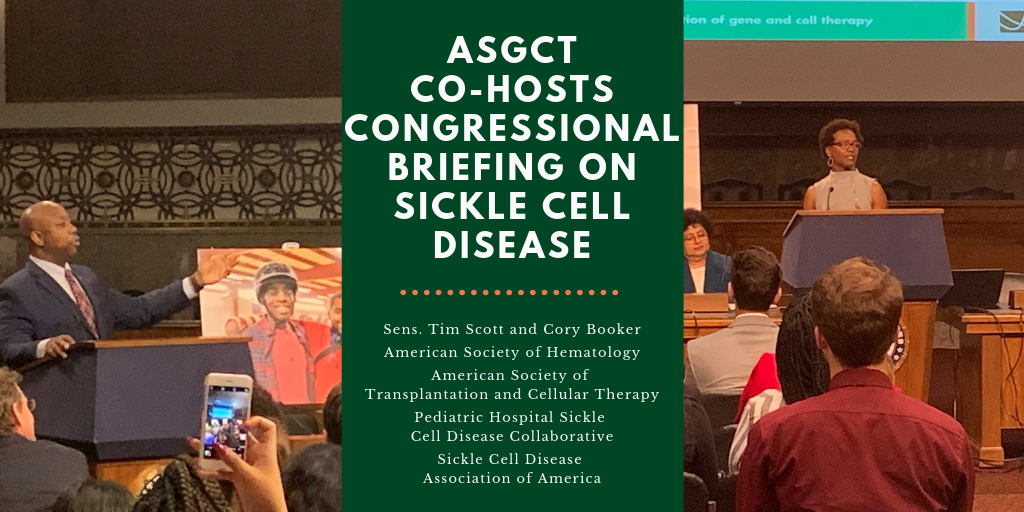ASGCT Co-Hosts Congressional Briefing on Progressing Gene Therapy for Sickle Cell Disease
ASGCT Staff - June 20, 2019
On Tuesday, June 18, ASGCT co-hosted a congressional briefing on sickle cell disease with Sens. Tim Scott and Cory Booker addressing a standing-room only audience of nearly 100 congressional staff members and other stakeholders about progress in gene therapy and gene editing for sickle cell disease and the policy implications surrounding the emerging technologies.

On Tuesday ASGCT co-hosted a congressional briefing on sickle cell disease (SCD) with Sens. Tim Scott and Cory Booker alongside the American Society of Hematology, the American Society of Transplantation and Cellular Therapy, the Pediatric Hospital Sickle Cell Disease Collaborative, and the Sickle Cell Disease Association of America. Taking place a day before World Sickle Cell Day, and before a standing-room only audience of nearly 100 congressional staff members and other stakeholders, the briefing addressed progress in gene therapy and gene editing for sickle cell disease and the policy implications surrounding the emerging technologies.
Scott kicked off the event by speaking on the need for improved access to breakthrough therapies to treat SCD upon approval.
“We want to make sure the drugs that are coming to market are able to make it into the homes of those who need them,” Scott said.
Citing the bleak reality of financial burdens placed on those currently living with SCD, their families, and the nation as a whole, Scott indicated that these therapies have the potential for life-enhancing benefits. ASGCT echoes Scott’s call for use of novel payment models to address the unique, one-time nature of gene therapies—payment over time and outcomes-based payments.
Other policies addressed include the need to increase funding for surveillance of the disease, authorized by the Sickle Cell Disease and Other Heritable Blood Disorders Research, Surveillance, Prevention, and Treatment Act, passed in December. The surveillance program is designed to improve the collection of national incidence and prevalence data for SCD, which would work to reduce health disparities and potentially improve access to therapies. The House has appropriated funds for this data collection through an amendment to its Labor HHS appropriations package. The Senate appropriations subcommittee has yet to propose its appropriations package. ASGCT also touched on the need for robust NIH research funding and reauthorization of the newborn screening program in 2019.
Three ASGCT members came from across the country to discuss the progress they and their peers have made in gene therapy and gene editing for SCD. Punam Malik, M.D. (Cincinnati Children’s Hospital); Matthew Porteus, M.D., Ph.D.(Stanford University); and David Williams, M.D. (Dana-Farber Cancer Institute, Boston Children’s Hospital and Harvard University) presented information on five of the six gene therapy and gene editing clinical trials that are currently active and recruiting, demonstrating the rapid progress that has been made in the field.
Preliminary results from these various gene therapy clinical trials have resulted in anti-sickling hemoglobin levels of 22-30 percent (levels greater than 20 percent provide benefits to patients); near-complete to complete elimination of pain crises; and a reduction of sickling (abnormal) hemoglobin to ≤ 50 percent at ≥ 6 months after treatment. Gene editing for SCD utilizing CRISPR Cas9 technology, very early in clinical trials, has shown a 40-60 percent increase in expression of fetal hemoglobin (functioning hemoglobin) in animals. ASGCT’s new Clinical Trial Finder was identified as a resource to remain updated on these and other gene and cell therapies in clinical trials, available at asgct.org/clinicaltrials.